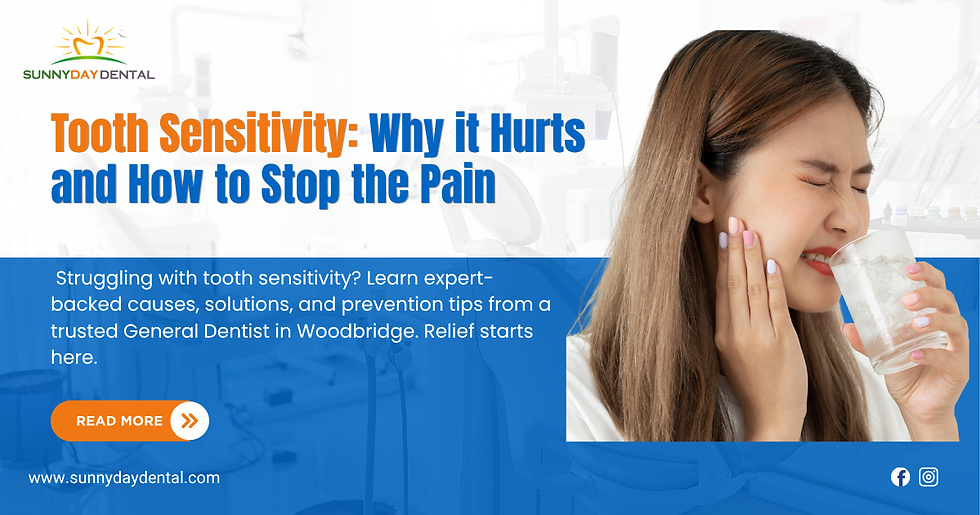Teeth Cleaning: Why It’s Crucial & 3 Risks to Avoid
- Sunny Day Dental
- May 3
- 4 min read

Let’s face it: brushing twice a day isn’t enough. Your oral health depends on much more than your toothbrush. Teeth cleaning, performed by a dental professional, is one of the most effective ways to prevent disease, maintain fresh breath, and keep your smile healthy.
In this blog, we’ll explore why regular teeth cleaning matters, its lesser-known benefits, possible side effects, risks to avoid, and how to find a trusted dental provider near you. Whether you're in Brampton or Woodbridge, this guide will help you protect your smile with confidence.
What Is Teeth Cleaning?
Teeth cleaning (or dental prophylaxis) is a preventive treatment designed to remove plaque, tartar, and stains from your teeth. Despite brushing and flossing daily, bacteria and debris tend to settle in hard-to-reach areas. Over time, these deposits can solidify into tartar, leading to gum disease and tooth decay if not removed professionally.
The Importance of Teeth Cleaning
Let’s dive into the importance of teeth cleaning and why dentists worldwide emphasize it every six months.
1. Prevents Gum Disease
When plaque accumulates below the gumline, it irritates gum tissue, causing inflammation and infection. If untreated, it can lead to periodontitis, a severe gum disease that may cause bone loss. Regular teeth cleaning reduces this risk significantly.
2. Avoids Cavities and Tooth Loss
Plaque is acidic, and constant exposure to these acids can erode enamel and create cavities. Tartar, once formed, cannot be removed at home. Only professional cleanings can remove it effectively and preserve your teeth.
3. Lowers Risk of Systemic Diseases
Oral health is linked to overall health. Research in 2025 from the Canadian Dental Association Journal emphasized that consistent teeth cleaning helps lower risks of heart disease, stroke, and even Alzheimer’s due to reduced bacterial load in the bloodstream.
Top 3 Benefits of Teeth Cleaning
While the medical perks are significant, the benefits of teeth cleaning also extend into daily life:
A. Brighter Smile
Professional polishing removes surface stains caused by coffee, tea, wine, and smoking—giving your smile a naturally brighter glow.
B. Fresher Breath
Bad breath (halitosis) often stems from accumulated plaque and bacteria. Teeth cleaning clears these out, helping your breath stay fresher longer.
C. Early Detection of Issues
Cleanings are often paired with exams, allowing dentists to spot cavities, cracked fillings, or early signs of oral cancer before they worsen.
3 Risks You Should Avoid
Though generally safe, there are certain teeth cleaning side effects and risks to be aware of, especially if not performed correctly.
1. Sensitivity After Cleaning
Some patients experience short-term sensitivity to cold or pressure. This is among the most common teeth cleaning side effects and usually subsides within a few days.
2. Gum Irritation
Improper technique or excessive force may lead to gum inflammation or soreness. Always ensure your hygienist uses gentle, modern equipment—especially when seeking Dental Cleaning in Brampton or nearby clinics.
3. Enamel Erosion from Overcleaning
Too-frequent or aggressive scraping can wear down enamel. While rare, this is why personalized cleaning schedules (typically every 6 months) are crucial.
Finding the Right “Teeth Cleaning Woodbridge”
Searching for "teeth cleaning Woodbridge " often brings up countless results, but how do you choose the right provider?
Look for:
Dentists with positive patient testimonials and ratings
Hygienists using the latest cleaning tools and sterilization techniques
Clinics offering full transparency on procedures and costs
Convenient locations like Teeth Cleanings in Woodbridge or Brampton
Tip: Always call the clinic in advance to inquire about the type of cleaning they offer and whether they tailor their approach to your dental history.
Pro Tips: What to Do Before and After Your Teeth Cleaning
Before your appointment:
Brush and floss gently
Make a list of concerns or sensitivities
Avoid heavy meals or sugary drinks
After your appointment:
Skip staining foods (coffee, berries, wine) for 24 hours
Use desensitizing toothpaste if needed
Stay hydrated to stimulate saliva flow
Follow-up with daily brushing and flossing
What are the risks and benefits of teeth cleaning?
Teeth cleaning removes plaque, brightens teeth, prevents gum disease, and detects early oral issues. Risks include short-term sensitivity or gum irritation if overdone.
5 Unique FAQs About Teeth Cleaning
1. Do dental cleanings whiten teeth like bleaching?
Not exactly. While teeth cleaning removes external stains and polishes enamel, it doesn't chemically bleach your teeth. For whitening, professional bleaching is needed. However, many patients find their teeth visibly brighter after a cleaning.
2. Can I do teeth cleaning at home with tools I buy online?
DIY tools can harm your gums or enamel if used incorrectly. Only licensed dental professionals are trained to perform teeth cleaning safely and effectively.
3. Should I get a cleaning if I have braces or Invisalign?
Yes! In fact, you're more prone to buildup with braces. Regular cleanings are crucial during orthodontic treatment to prevent decay and maintain gum health.
4. Is it normal to bleed during or after cleaning?
Mild bleeding can occur, especially if your gums are inflamed. However, frequent or heavy bleeding is not normal and should be addressed by your dentist immediately.
5. What if I haven’t had a cleaning in years?
Don’t worry—you're not alone. Your first cleaning may take longer and be divided into multiple sessions (deep cleaning), but it’s never too late to start fresh. Your dentist will ease you into a plan that suits your oral health needs.
Visit Sunny Day Dental for Gentle Teeth Cleaning in Woodbridge
Your smile says more about you than words ever could. At Sunny Day Dental, we believe in keeping it healthy, radiant, and confident. Whether you’re due for a routine check-up or looking to address buildup and stains, our team specializes in personalized, gentle teeth cleaning treatments for patients of all ages.




Comments